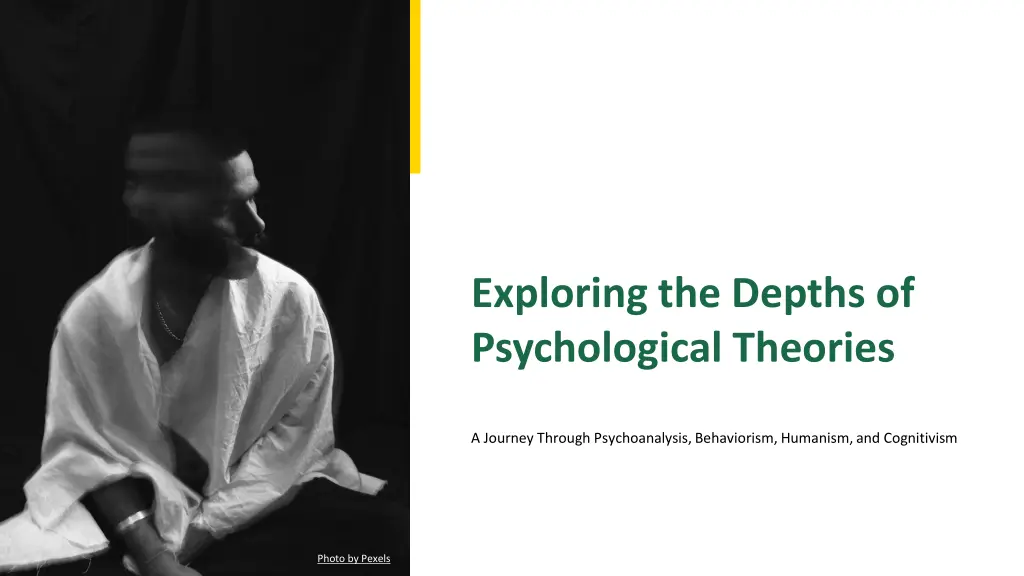
Journey Through Psychological Theories: Psychoanalysis, Behaviorism, Humanism, Cognitivism
Delve into the depths of psychological theories as you explore psychoanalysis, behaviorism, humanism, and cognitivism. Uncover key figures, core concepts, and applications in child development while understanding the evolution of these major schools of thought.
Download Presentation

Please find below an Image/Link to download the presentation.
The content on the website is provided AS IS for your information and personal use only. It may not be sold, licensed, or shared on other websites without obtaining consent from the author. If you encounter any issues during the download, it is possible that the publisher has removed the file from their server.
You are allowed to download the files provided on this website for personal or commercial use, subject to the condition that they are used lawfully. All files are the property of their respective owners.
The content on the website is provided AS IS for your information and personal use only. It may not be sold, licensed, or shared on other websites without obtaining consent from the author.
E N D
Presentation Transcript
Exploring the Depths of Psychological Theories A Journey Through Psychoanalysis, Behaviorism, Humanism, and Cognitivism Photo by Pexels
01 Introduction to Psychological Theories Table of Contents 02 Psychoanalysis: Key Figures and Concepts 03 Behaviorism: Key Figures and Concepts 04 Humanism: Key Figures and Concepts 05 Cognitivism: Key Figures and Concepts 06 Psychoanalysis: Core Concepts 07 Behaviorism: Core Concepts 08 Humanism: Core Concepts 09 Cognitivism: Core Concepts 10 Applications in Child Development 11 Conclusion and Future Directions
1 Introduction to Psychological Theories Understanding the Four Major Schools The first force in psychology, focusing on observable behavior and the connection between stimuli and responses. The second force, offering a perspective on human nature, developed earlier than behaviorism but less influential. The third force, emphasizing human potential and self- actualization, more influential than cognitivism. The current focus of research, with a significant rise in influence in modern times. Photo by Pexels
2 Psychoanalysis: Key Figures and Concepts Freud and Erikson's Contributions Founder of psychoanalysis, emphasizing the importance of early experiences and internal drives. Expanded on Freud's theories, focusing on psychosocial development across the lifespan. Freud's concept of the unconscious, where most psychological experiences are hidden. Id, Ego, and Superego - the three components of personality according to Freud. Photo by Pexels
3 Behaviorism: Key Figures and Concepts Pavlov, Skinner, and Bandura's Contributions Known for classical conditioning, demonstrating how behaviors can be learned throughassociation. Developed operant conditioning, focusing on reinforcement and punishment. Introduced social learning theory, emphasizing observational learning. The process of learning associations between environmental stimuli and behavioral responses. Photo by Pexels
4 Humanism: Key Figures and Concepts Maslow and Rogers' Contributions Proposed the hierarchy of needs, highlighting self- actualization as the ultimate goal. Developed client-centered therapy, focusing on the individual's potentialfor growth. The realization of one's full potential and the desire to become the best version of oneself. The belief that humans have an inherent ability to grow and develop positively. Photo by Pexels
5 Cognitivism: Key Figures and Concepts Piaget and Vygotsky's Contributions Known for his theory of cognitive development, focusing on how children construct knowledge. Emphasized the social context of learning and the role of language in cognitive development. The process of acquiring intelligence and increasingly advanced thoughtand problem-solvingability. Vygotsky's concept of the difference between what a learner can do without help and what they can achieve with guidance. Photo by Pexels
6 Psychoanalysis: Core Concepts Understanding the Unconscious and Personality Behaviors are driven by psychological forces to satisfy instinctual impulses. The dual forces of survival and destruction that influence behavior. The balance between Id, Ego, and Superego for a healthy personality. Conscious, preconscious, and unconscious levels of awareness. Photo by Pexels
7 Behaviorism: Core Concepts Learning Through Conditioning Learning through association, as demonstrated by Pavlov's experiments. Learning throughconsequences, as developed by Skinner. Learning by observing others, as proposed by Bandura. Techniques to change behavior through reinforcement and punishment. Photo by Pexels
8 Humanism: Core Concepts Fostering Growth and Self-Actualization Maslow's pyramid of human needs, from basic to self- fulfillment. Rogers' approach focusing on empathy and unconditional positive regard. The continuous process of developing one's abilities and potential. An individual's perception of themselves and their abilities. Photo by Pexels
9 Cognitivism: Core Concepts Understanding Mental Processes Piaget's stages of cognitive growth from infancy to adulthood. Vygotsky's method of providing support to enhance learning. The way humans perceive, analyze, and remember information. The theory that learners construct knowledge through experiences. Photo by Pexels
10 Applications in Child Development Theories in Practice Using unconscious analysis and personality assessment in child development. Applying behavior modification strategies in educational settings. Implementing scaffolding and cognitive development principles in education. Fostering open education and self-directed learning environments. Photo by Pexels
11 Conclusion and Future Directions The Evolving Landscape of Psychology Combining insights from different schools for a holistic understanding of psychology. The rise of new approaches and technologies in psychological research. The impact of psychological theories on cultures and societies worldwide. Exploring new frontiers in understanding human behavior and mental processes. Photo by Pexels
